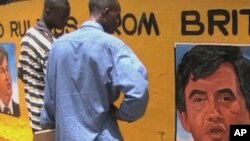British voters go to the polls Thursday to elect new members of parliament and in turn a new government. Leaders of three main parties are vying for the prime minister's position in a race that is promising to be very tight.
After weeks of official campaigning and months of political jockeying, voters will have their say on who they want to send to the 650-member parliament that will decide who forms the next government.
Incumbent Gordon Brown of the left-of-center Labor Party and arch-rival David Cameron of the center-right Conservative Party are vying for the prime minister's job and have been campaigning relentlessly. But they have been upstaged by an "outsider", Nick Clegg of the Liberal Democrats, a third party that has until now never seriously figured in the political race.
But, Britain's first ever televised debates changed things and thrust the young and charismatic Clegg into the limelight, making this race a tight contest.
The state of the economy has been the main issue as voters readily admit. "The biggest concern I would say, is the economic situation we are facing at the moment," one voter said.
For many, immigration, health care, education and local issues matter greatly. "In our local area, it would be police and security," said another.
And for many it is change, honesty and transparency in politics. "I think I probably speak for most of the British people when they believe they want to hear honest things and they want to actually see them being done," a voter said.
Opinion polls indicate a tight and potentially inconclusive race with neither of the two main parties winning an outright majority - meaning a possible coalition government and Nick Clegg's Liberal Democrats potentially holding the balance of power.




